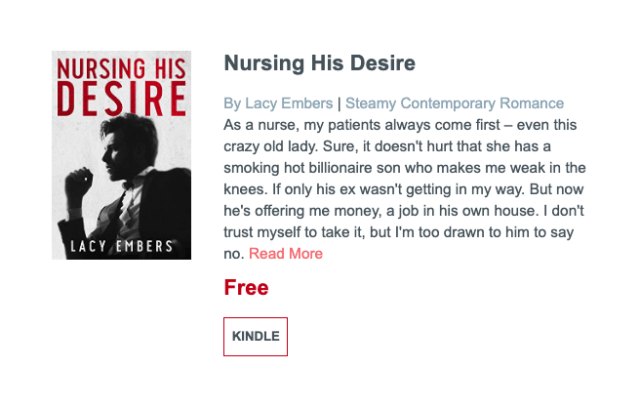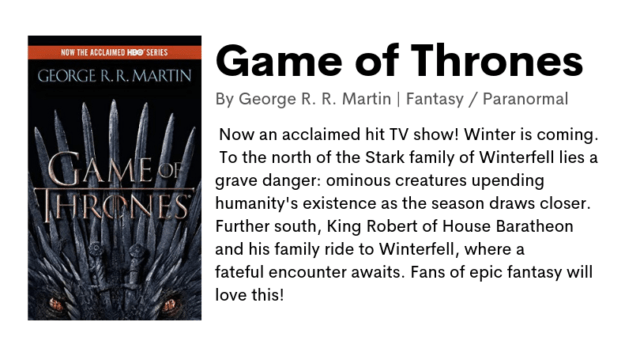From Written Word Media:
We want to kick our post on writing the perfect book description off with a metaphor: one where you imagine your reader as a fish and your book as a tasty worm. You want readers to buy the book that you’re selling, similar to how you’d want a fish to grab the worm if you’re fishing! The only problem is that there are so many worms (or books in our case) to choose from in the world.
With all these available worms, you’re worried that yours might go completely overlooked. So how do you make your worm the prettiest, shiniest, best-looking option? You package it well.
We’ve shown you that there are many steps to successfully marketing your book, such as creating an attractive book cover, properly utilizing Amazon ads, setting up and managing an author page, and more.
But one crucial detail that authors often overlook is their book description. To reference our Freebooksy and Bargain Booksy emails, this is what we’re referring to:

Book descriptions are your way of quickly grabbing the reader’s attention and showing them why they need your book. With so many options for readers to choose from, your book description could be what makes or breaks a potential sale!
A successful book description will stop readers in their tracks, intriguing them enough to want to engage with your book. An unsuccessful book description, however, will make readers move on to the next book.
. . . .
Part of knowing how to write a successful book description that sells is knowing what not to do. Let’s break down the do’s and don’ts you’ll want to follow when writing your book descriptions:
The do’s:
- Succinct and to the point
- Proper utilization of grammar
- Eye-catching, powerful language
- Inclusion of awards, high reviews, or ratings
- “Perfect for fans of… x, y, and z.”
- Audience and age appropriate

Check out this example of a “do” book description: Clearly written with a powerful descriptor (“acclaimed”), it gives just a snippet of the plot while still intriguing readers. Makes you want to buy the book, right?
The don’ts:
- Shouty caps
- Too short
- Cut off words
- False claims
- Misspellings or typos
- Dated language like “just released”
- Aggressive call to action (“You MUST buy this book!”)
Link to the rest at Written Word Media
Here’s an example of a “don’t” that’s really quite cringeworthy:
A famous science fiction novel from the 1960s was recently released in an updated edition. This updated edition proclaims “Now a Major Motion Picture” on the front cover.
Which has been true since 1984. David Lynch was a respected director then; the de Laurentiis production group was a mid-major player; the film got a wide release, and went through multiple VHS editions and was a centerpiece of (if I recall correctly) Showtime in the later 1980s. The film, umm, sucked. (The novel isn’t nearly as good as its reputation, but that’s for another time.) But Dune was a major motion picture then, not just in the recent partial release.
I still believe the Lynch DUNE was a money laundering operation.
No way did that movie cost $40m in 1980 cash.
Not with recycled gladiator movie sets and paint stirrer props.
As for DUNE, to properly appreciate it one needs to ignore the sequels and put it in context of its times, the early ’60’s northwest. Like most SF it is a reflection of its time and place. Herbert wrote DUNE from his experiences in the region before ecology became a political issue and he wrote it as one of the first true believers. As a writer, he had his moments: DUNE, UNDER PRESSURE, WHIPPING STAR, and he had times when…the story didn’t jell…
One of the best examples of time/place influence is Alfred Bester’s THE STARS MY DESTINATION, one of the best SF novels of the 20th. He wrote it over a stay in Britain in the ’50s and his excellent world building is positively british and even Victorian in its decadent culture being forced into restructuring. The way he explained it, every time he needed a character name, he would open the phonebook, so it might have been on purpose.
Lynch, on the other hand, phoned it in on DUNE. A cash grab most likely.
I vehemently disagree on the assessment of the original novel. I was growing up in the early ’60s northwest, and let’s just say that it was no monolith of treehuggers. As to specific “parallel issues” regarding the depiction of culture, they seemed noncredible to me when I read the book in the early 70s… and got less credible the more I learned about the purported source cultures (“less credible” meaning “threw overpriced mass-market paperback copy at the wall”).
I find the 60s in the US a black hole at novel length for speculative fiction, with only a tiny handful of exceptions (The Left Hand of Darkness being the primary example). As is typical of all art/literary forms, for a while the primary inventiveness and value was in a different format/length — shorter fiction, even film. Matters cycled the other direction by the late 70s such that innovation was occurring and classics were being created almost exclusively at novel (and greater!) length. And it continues to change, which is entirely appropriate for the literature of change.
If LEFT HAND OF DARKNESS met your standards then Samuel Delany might have met them, too. Or BRUNNER. Generally I’m not much of a LeGuin fan other than tbe EARTHSEA books. Early, too derivative, latter too…too preachy. She was probably born too early. (Or I was borntoo late for her messages.)
I came late to those works but my favorites of the era are Heinlein, Zelazny, Farmer, Anderson, and Dickson. Asimov and Clarke only tickled me with their 50’s, 70’s, and 80’s works. Beyond those, yes, the 60’s was a bit of a down period for my taste. Things only picked late in the decade.
Oddly enough though, the decade bred a lot of good writers who grew up on the earlier stuff. Especially in the fantasy wing…
I find Delany’s novel-length work of the 1960s innovative only within the speculative-fiction ghetto (and somewhat overreaching in ambition-versus-execution, but then that can be said about most postmodern novels). That’s not saying that it’s bad; I was trying to be concise. Similar as to Brunner, whose ideas almost always exceeded his ability (or, more properly, the editorial/publishing system’s ability) to execute them in a purely fictional mode. Lem and the Strugatskis are other examples.
This is a problem at the core of my scholarly literary work: One doesn’t analyze and theorize upon Orwell and Huxley at dissertation length without engaging with the problem, unless one is a far-right or far-left ideologue trying to shoehorn a size 14 factual-exposition foot into a size 5 no-fictional-technique-wanted-here shoe. It is, if anything, worse in self-identified category fiction than in archly lit’rary fiction.
But my point related to the OP was that commercial publishers think they can violate those “don’t do this” rules all the time, and do… and then wonder why sales are not meeting the internal expectations† hyped up by their marketing geenyuses who couldn’t get jobs outside the publishing industry.
† I do not claim to have specific sales data regarding this particular edition of Dune. <sarcasm> I invite the publisher to disclose both its pre-issue cost-sales analytic data and meeting minutes, and the post-issue third-party-audited revenue statements, to demonstrate that I’m off base. Just like would be required in a H’wood profit-participation lawsuit. </sarcasm>
“Speculative-fiction ghetto.”
Gotcha.
No, SF isn’t for you.
None of it.
SF exists for entirely different purposes than what you look for.
I use “speculative fiction” for three reasons: Homage to my late client Mr Ellison, a more-descriptive-and-more-inclusive term than “science fiction, fantasy, and horror,” and only tertiarily because my preference is for at least acknowledging literary value and good writing over slam-bang action with idiot plots and idiot characters that would not be out of place as the subject of bad {insert disfavored ethnicity/national origin here} jokes by sixth-graders. Besides: Calling Star Wars and Perelandra and The Heritage of Hastur “science fiction” or even “SF” is hanging my suspension of disbelief by the neck until dead. At which time it will be made into a zombie.
The “ghetto” is the way commercial publishing treats speculative fiction. Nothing more, nothing less. Descriptive and disdain for the segregation, not for the segregated.
Is that the one where Kyle MacLachlan is yelling “Wham” at his blaster and it then goes “Wham?” They are all running across the sand yelling “Wham.” Saves special effects and sound expense.
The MacLachlan version, yes.
The SyFy channel version was much cheaper and way better.
$20M 2000 dollars vs $42M 1980 dollars.
https://www.tor.com/2017/05/09/syfys-dune-miniseries-is-the-most-okay-adaptation-of-the-book-to-date/#:~:text=The%20first%20came%20in%202000.%20Frank%20Herbert%E2%80%99s%20Dune,cast%20and%20won%20Emmys%20for%20effects%20and%20cinematography.
Besides: “Nuns in space.” : D